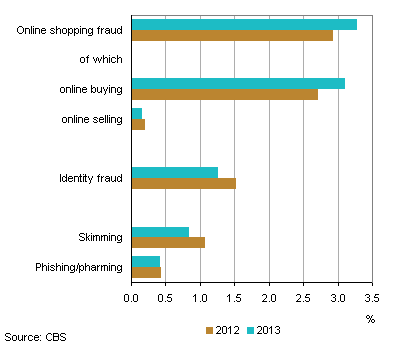More internet fraud, less skimming

The number of victims of online shopping fraud has risen last year relative to 2012. The number of bank, cash and credit card skimming crimes declined. Few victims of this type of criminal offence bothered to notify the police.
More victims of online shopping fraud
Last year, 3.3 percent in the Dutch population aged 15 years or older (nearly 450 thousand individuals) reported they had been scammed while buying or selling goods or services online. Most of these victims ordered and paid goods or services online, but never received their purchase. The proportion of people who stated they had faced this type of offence rose from 2.7 percent in 2012 to 3.1 percent in 2013. The growing number of online buyers also plays a part in this respect.
Victims of online shopping fraud and identity fraud

Fewer victims of skimming
In 2013, 1.3 percent reported they had experienced identity fraud while using electronic or online payment systems, just below the level of 1.5 percent recorded in 2012. Skimming, i.e. illegal copying of bank, cash and credit card information by using skimming devices, almost entirely accounts for the reduction. The proportion of victims of skimming crimes fell from 1.1 percent in 2012 to 0.8 percent in 2013. Banks have taken measures to combat skimming crimes, like replacing the magnetic strips on cash cards by chips and routinely blocking foreign cash cards from outside the European continent. The proportion, who reported they had been victims of phishing of pharming, remained stable at 0.4 percent.
Few people report identity fraud
One in five cases of online shopping fraud was reported to the police in 2013. With respect to identity fraud, in only 13 percent of cases the police was notified, but identity fraud was nearly always reported to the bank. Less than half of shopping fraud crimes were reported to the police.
Reporting rate shopping fraud and identity fraud , 2013

Rianne Kloosterman.